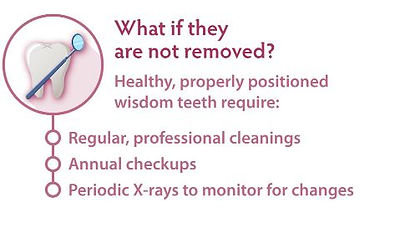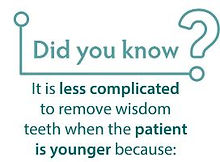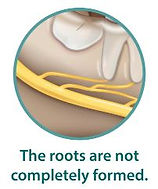Nickolas S. Maskas DDS, MD

337-888-4771

What are wisdom teeth?
Third molars (wisdom teeth) are teeth that develop in the very back of the jaw bones. They are the last teeth to develop and usually are not finished developing until around age 18-20. Most people have 4 wisdom teeth (2 on top and 2 on the bottom). Most people do not have enough room in their mouth for these teeth to come in properly, which results in impaction. An impacted tooth is unable to come in to the mouth to take its proper place, usually due to a physical obstruction or lack of space.


Should I have my wisdom teeth extracted even if they don't hurt?
In many situations it is more advantageous for patients to have their wisdom teeth extracted even if they don't hurt. It is your (the patient’s) decision whether or not to have the teeth extracted, but my goal as your oral and maxillofacial surgeon is to provide you with the information you need to make an informed decision.
What are some risks of leaving impacted wisdom teeth in place?
Most wisdom teeth become impacted. When a wisdom tooth becomes impacted, it poses several risks to patients.
Pain: One of the more common complications of impacted wisdom teeth is pain. Patients often report intermittent achy pain from their wisdom teeth.
Cysts/Tumors: One of the most serious complications of impacted wisdom teeth is cyst or tumor formation around the tooth. Impacted wisdom teeth which are not removed require a lifetime of periodic x-rays to monitor for cysts and tumors. Unfortunately, should cyst formation occur, it is often not recognized until years later. These cysts or tumors can grow large in size, and extensive surgery is sometimes needed to remove the cyst/tumor if it is not caught early.
Tooth Decay: Some impacted teeth are at higher risk for tooth decay and can place patients at risk for serious infections.
Gum Disease: Impacted teeth place patients at increased risk for gum (periodontal) disease, pericoronitis (severe gum swelling and pain), and infection if the tooth is partially in the mouth.
Jaw Fracture: Keeping lower impacted wisdom teeth in place increases a patient’s risk for jaw (mandible) fracture by several times in the event of facial trauma.
Tooth Crowding/Orthodontics: There is some evidence that impacted wisdom teeth may contribute to crowding of other teeth in the mouth and many times an orthodontist will require the extraction of wisdom teeth in order to properly straighten teeth.
Hygiene Difficulty: Even if wisdom teeth aren’t impacted and do come into the mouth properly, it can be very difficult for patients to keep these teeth clean since they are positioned so far back in the mouth. This places the patient at high risk for dental decay (cavities), infection, and periodontal (gum) disease.

Are there any risks to having my teeth removed?
As with anything in life, having a minor surgical procedure (tooth extraction) carries with it some risk. These risks will be explained to you during the informed consent process. The complication rate of wisdom teeth extraction is very low, especially when the teeth are removed at the appropriate age (usually age 14-24). Risks can include bleeding, infection, dry socket, and damage to adjacent structures (very rare). I will personally review your x-rays with you at your consultation visit and discuss any potential complications as they relate to your specific case. My goal is to provide you with the information necessary so that you can feel confident in your decision to seek care.
What if I choose not to have my wisdom teeth removed?
A lifetime of periodic monitoring of the teeth with x-rays and exams to check for cyst/tumor formation will be necessary to ensure your safety. It is possible that some patients may keep their wisdom teeth for a lifetime without problems, but it is impossible to predict if this would be the case for any given patient. Importantly, patients choosing not to have the teeth extracted should know that if the teeth cause problems later in life and require removal, the difficulty and complication rate of removal unfortunately increases as patients age.

At what age should I have my wisdom teeth removed?
The ideal age for wisdom tooth removal is between the ages of 14-24. There are many advantages to having the teeth removed at this age. The roots of the wisdom teeth are normally not fully developed during this time which makes extraction easier and decreases the risk of complications. Also, younger people have increased healing/recovery potential which makes the healing period easier and shorter when performed at a younger age.



What are my anesthesia options for this procedure and can I go to sleep?
Please see the anesthesia section of the website for an extensive discussion on different anesthetic options.
How are impacted wisdom teeth removed?
Wisdom tooth removal is a small surgical procedure. Normally, a small incision is made in the gums to access the tooth. Sometimes minimal bone must be removed from over the tooth to help removal. Dissolvable stitches are then placed to close the gums.
Do I need a bone graft after my wisdom teeth extractions?
In general, most younger people do not need bone grafting after wisdom teeth extractions. If the patient is over the age of 25 or the teeth are situated such that a large defect will be left in the bone after extraction, I may recommend a bone graft into the site at the time of extractions. Younger patients tend to have greater and faster ability for extraction sites to heal with normal bone fill. Older patients are at higher risk for incomplete bone fill after lower wisdom tooth extractions, potentially leaving the jaw bone weaker in that area or creating support problems for the nearby second molars. I would recommend bone grafting in these situations.
Will I have stitches?
In the majority of cases dissolvable stitches are placed at the lower extraction sites. Occasionally, stitches are placed at the top as well.
How long will the stitches take to dissolve?
The exact time varies from person to person, but typically the sutures will dissolve or fall out within 1-2 weeks.
What medications are normally prescribed after wisdom teeth removal?
In most circumstances, pain medications and an antibiotic mouth rinse is prescribed. In certain situations, antibiotics in pill form are prescribed. You will be sent home with extra gauze and written post-operative instructions.
What can I expect after I have my wisdom teeth removed?
Wisdom teeth removal is a small surgical procedure. Some discomfort and swelling is normal after the procedure. This is usually minor and resolves within a few days. Please note that swelling can be worse one or two days after the procedure and this is expected. Also, you will have gauze in your mouth after the procedure, and it is normal to saturate several sets of gauze on the day of your procedure. Some minor oozing may continue for up to 24 hours. Most people will also experience a minor and temporary decrease in mouth opening for several days which is normal.
What can I eat after wisdom teeth extractions?
We recommend biting on gauze for at least 2 hours after the procedure. At this point, the gauze may be removed to allow for drinking fluids or eating soft foods. You should maintain a soft diet for 2-3 days after the procedure to avoid damaging the surgical sites. Examples of soft food include mashed potatoes, soft pasta, ice cream, soup, etc. Please see below for link to diet suggestions after wisdom teeth extraction.
Should I brush my teeth after wisdom teeth extractions?
Yes. You should brush your teeth as you normally would. Avoid brushing over the extraction sites. Maintaining excellent oral hygiene will help prevent infection of the extraction sites and expedite the healing process.
How long do extraction sites take to heal?
Your discomfort should nearly resolve within 3-4 days, and you may return to eating normal foods. The gums will generally take about 6 weeks to completely heal over the extraction sites.
What if my pain persists or gets worse several days after wisdom teeth extractions?
This could be a sign of a dry socket. Please notify our office, and I will be happy to evaluate you on the same day.
What is a dry socket?
A dry socket is a condition where the blood clot dissolves from the extraction socket leaving an empty socket. It is not an infection, but the exact reasons it occurs are not known. A dry socket results in soreness of the area. Medicated rinses are used to treat a dry socket. The problem usually resolves within 1 week.
What important instructions do I need to know for after my wisdom teeth extractions?
Please see the section on postoperative instructions for this information.
Will there be a follow up appointment?
You will be scheduled for a follow up visit approximately 1 week after your procedure. If you have any problems or questions I will be happy to see you on any day postoperatively. The complication rate after wisdom teeth extractions is very low and in many cases, patients may decide a follow up is not necessary since they are feeling well. If you do not wish to attend your follow up visit, please let our office know at least 24 hours in advance.
